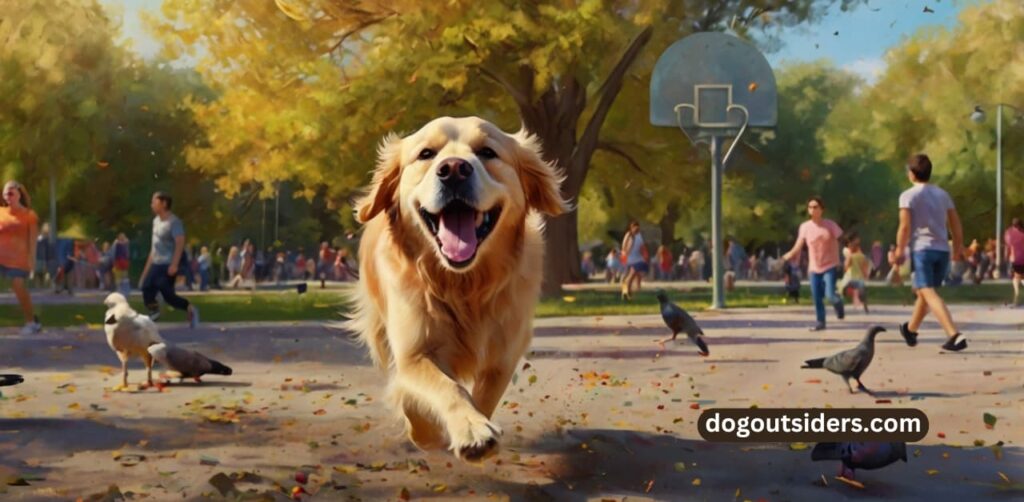When I’m at home, my dog listens to me without fail. However, once we step outside, it’s like I’m invisible. Commands are ignored, distractions reign supreme, and frustration sets in. If this scenario sounds all too familiar, you’re not alone. Training a dog to listen amidst outdoor distractions can be a challenging feat. But fear not, there are effective strategies to bridge this gap in communication and regain your dog’s attention and obedience outside the comfort of home. In this post, I’ll share practical tips and techniques to help you overcome the hurdle of having a dog that doesn’t listen to you outside.
Key Takeaways
- Consistent Training: Regular training sessions outside can help your dog generalize commands and improve obedience in different environments.
- Increase Exposure: Expose your dog to various outdoor settings gradually to help them become more accustomed to listening in different situations.
- Be Relevant: Make yourself more engaging and rewarding for your dog outdoors to increase their motivation to listen to you.
- Use Positive Reinforcement: Employ positive reinforcement techniques like treats and praise to reinforce good behavior when your dog listens outside.
- Practice Patience: Developing outdoor listening skills takes time and patience, so be consistent and persistent in your training efforts.
- Seek Professional Help: If you encounter significant challenges with your dog’s behavior in public spaces, consider seeking guidance from a professional trainer or behaviorist.
Why Dogs Ignore Commands Outside

Using Treats
Use treats to lure the dog into performing known behaviors outside. Reward them immediately for following commands, reinforcing positive behavior. Consistency is key in training dogs to listen outdoors.
Taking Frequent Walks
Frequent walks help normalize the outdoor experience for dogs. Regular exposure reduces distractions and increases focus on commands. Gradually extend the duration of walks to build obedience.
Redirecting Energy
Redirect the dog’s energy towards desired behaviors rather than distractions. Engage them in activities that require listening and responding to commands. Consistent practice reinforces good behavior over time.
Understanding Generalization Issues

Teaching Environments
Teaching indoors may not always translate to outdoors for dogs. They are situational learners, so new environments can be distracting. To improve listening skills outside, practice commands in different locations.
Sometimes, dogs associate commands with specific places or people. Varying training locations helps them understand that commands apply everywhere. Reinforce good behavior with treats or praise to encourage listening in diverse settings.
Consistency and Patience
Consistency is key when teaching dogs new behaviors. Use the same commands and rewards in different environments to help them generalize. Be patient; learning to listen outside takes time and practice.
In my experience, practicing obedience commands in parks and quiet streets helped my dog listen better outdoors. I also found that using high-value treats during training sessions increased his focus and responsiveness.
The Role of Exposure in Obedience
Outdoor Environment
Lack of proper exposure to outdoor environments can lead to distractions. Dogs may find it challenging to focus on commands when surrounded by unfamiliar sights and sounds. To address this, gradually introduce your dog to various outdoor settings to build their confidence.
Frequent outings help normalize the outdoor experience for your dog. By exposing them to different environments regularly, they learn to adapt and remain attentive to your commands. Start with quiet locations before progressing to busier areas to prevent overwhelming your pet.
Reinforcement Techniques
Reinforcing behaviors with rewards is crucial in developing obedience. Use positive reinforcement such as treats or praise to encourage desired actions. Consistency is key – reward good behavior immediately to reinforce the connection between the action and the reward.
To strengthen your dog’s obedience, practice commands in different outdoor settings. This helps them generalize the behavior across various environments. Gradually increase distractions during training sessions to test your dog’s ability to focus amidst external stimuli.
In my experience, incorporating playtime into training sessions can make learning more enjoyable for your dog. Interactive games not only reinforce obedience but also strengthen the bond between you and your pet. Remember, patience and consistency are essential for successful training outcomes.
Making Yourself More Relevant Outdoors

Redirecting Focus
To make yourself more relevant outdoors, redirect the dog’s focus towards you. Use treats or toys to grab its attention away from distractions like other animals or noises. This redirection helps in reinforcing positive behaviors and building a stronger bond with your pet.
Sometimes, different surroundings can overwhelm a dog, making it harder for them to listen. By redirecting their focus, you are helping them feel more secure and connected to you. Remember to practice this technique consistently for better results.
Rewarding Attention
Rewarding attention from your dog can be a powerful tool in improving obedience. When your dog chooses to listen to you over outside stimuli, acknowledge and reward this behavior. This positive reinforcement strengthens the desired behavior and encourages them to continue listening.
By being more rewarding than the distractions present in the environment, you are establishing yourself as the leader in your dog’s eyes. This leadership role is crucial for effective communication and obedience training. Consistency is key in reinforcing this dynamic.
Establishing Connection
Gaining your dog’s attention is essential for successful training outdoors. Establish a strong connection by engaging in fun activities together. Play games or go for walks in the park to create positive associations with listening to your commands.
Personal Experience: I found that incorporating short training sessions during our outdoor walks helped my dog focus better on me rather than the surroundings. It improved our communication and strengthened our bond.
List:
- Use treats or toys for redirection
- Consistent practice is essential
- Acknowledge and reward attentive behavior
Incorporating fun activities into your outdoor training sessions not only makes learning enjoyable but also deepens the bond between you and your furry companion.
Strategies for Improved Listening

Rewarding Attention
To enhance outdoor listening, reward your dog’s attention with treats or praise when they respond to commands like sit. Use high-value treats to reinforce good behavior effectively. Incorporate positive reinforcement consistently to strengthen the desired response.
Engage in short training sessions outdoors to maintain focus and prevent distractions. Practice sit commands in various environments to generalize the behavior. Consistency is key in reinforcing listening skills during outdoor activities.
Create a positive association with listening by incorporating play into training sessions. Utilize toys or games as rewards for following commands like sit correctly. Making training interactive and enjoyable encourages active participation from your dog.
Redirecting Energy
When faced with public behavior challenges, redirect your dog’s energy towards constructive activities. Channel their excitement into obedience training exercises like sit. Redirecting excess energy helps in improving focus and responsiveness.
Utilize mental stimulation toys or puzzles to keep your dog engaged and mentally active. A stimulated mind leads to better listening skills during outdoor interactions. Incorporate playtime before outdoor sessions to reduce pent-up energy levels.
Implement short breaks during outdoor activities to prevent overstimulation and maintain attention. Breaks provide opportunities for relaxation and refocusing, enhancing your dog’s receptiveness to commands like sit. Monitoring energy levels is crucial for effective training outcomes.
Improving Listening Skills
Teach specific outdoor behavior skills such as sit using positive reinforcement techniques. Start training in a familiar environment before transitioning to outdoor settings. Gradually increase distractions to test and improve listening abilities.
Establish clear communication through consistent verbal cues and hand signals for commands like sit. Reinforce these signals during outdoor training to ensure understanding in varied situations. Practice patience and persistence while teaching new behaviors for long-term success.
Integrate real-life scenarios into training sessions to simulate outdoor distractions effectively. Expose your dog to different sounds, sights, and smells while practicing commands like sit. Practical training enhances adaptability and responsiveness in diverse environments.
Teaching Outdoor Behavior Skills
Leash Manners
Teach leash manners by using positive reinforcement techniques. Start indoors and gradually transition to outdoor environments. Practice loose leash walking in low-distraction areas before progressing to busier settings.
Dog Obedience Class
Consider enrolling in a dog obedience class to improve outdoor behavior. These classes provide structured training sessions with obedience class instructors who can offer personalized guidance. Consistent practice and reinforcement outside of class are crucial for success.
Professional Dog Trainer
Hiring a professional dog trainer may be beneficial for addressing specific outdoor behavior issues. Look for a trainer experienced in working with good obedience instructor skills. Tailored training plans can help tackle poor leash manners effectively.
Using Treats for Training
Utilize dog treats as rewards during outdoor training sessions. Select high-value treats that your dog loves to increase motivation. Reward instances where your dog displays good behavior, such as responding to commands promptly or walking nicely on the leash.
Attention Reinforcement
Reinforce desired behaviors by rewarding instances where your dog gives you attention outdoors. This helps strengthen the bond between you and your pet while encouraging listening skills. Consistency is key in reinforcing positive behaviors during outdoor activities.
I find that incorporating short training sessions into daily walks at the dog park can be highly effective. By practicing beginner obedience commands in a familiar environment, dogs can gradually generalize these skills to other outdoor settings. Remember to keep training sessions fun and engaging for both you and your furry companion.
Behavior Management Tips
Implement potty training strategies consistently when outdoors to prevent accidents. Set clear expectations and provide ample opportunities for your dog to relieve themselves in appropriate areas. Establish a routine for outdoor activities to promote good behavior habits.
Seeking Guidance from Professionals
Consulting a vet can help rule out any underlying health issues that may affect your dog’s behavior outdoors. They can also provide recommendations on managing behavioral challenges specific to puppies, senior dogs, or other age groups. Seeking professional advice early can prevent long-term behavior problems.
Addressing Public Behavior Challenges
Redirect Energy
To address public behavior challenges with your dog, redirect their energy towards desired behaviors. Engage in activities that focus their attention on you rather than external stimuli. Use toys or treats to redirect their focus when distractions arise.
When out in public, redirecting your dog’s energy can help them stay focused on you. For example, if they start pulling towards another dog, redirect their attention back to you by using a treat or a favorite toy. This technique reinforces positive behavior and strengthens the bond between you and your dog.
By redirecting your dog’s energy effectively, you can prevent unwanted behaviors such as excessive barking or lunging at other dogs. Consistent redirection teaches your dog to look to you for guidance in challenging situations. Remember to be patient and consistent in your training approach.
Be Relevant
Make yourself more relevant to your dog than the external distractions present in public settings. Establish a strong bond based on trust and respect. Use positive reinforcement techniques to reinforce good behavior.
When working on outdoor listening skills, ensure that you are more relevant to your dog than any distractions around them. Use high-value treats or toys to capture their attention and maintain focus on you. Building a strong connection helps your dog see you as a source of guidance and security.
Being relevant to your dog means creating a positive association with listening to your commands. Practice obedience exercises in different environments to strengthen their response to your cues. Consistency and patience are key in becoming the focal point for your dog’s attention.
Reward Attention
Enhance outdoor listening strategies by consistently rewarding your dog’s attention towards you. Use treats, praise, or playtime as rewards for responding promptly to your commands. Reinforce good behavior to encourage continued focus.
Rewarding your dog’s attention during outdoor activities reinforces their positive behavior. By rewarding attention, you are encouraging them to listen and respond to your cues effectively. This positive reinforcement creates a mutually beneficial relationship built on trust and cooperation.
When training outdoors, remember to reward attention promptly to reinforce the desired behavior. Celebrate small victories and progress made by your dog in listening to you amidst distractions. Consistent rewards help solidify good listening habits and improve overall obedience skills.
Enhancing Outdoor Listening Strategies
Reward Instances
Reward instances where the dog gives attention to reinforce desired behaviors. This positive reinforcement will help the dog associate listening with receiving treats or praise. By doing this consistently, the dog will be more inclined to pay attention to you outdoors.
Redirect Energy Redirect the dog’s energy towards desired behaviors rather than distractions. Engaging the dog in activities it enjoys, such as playing fetch or going for a run, can help focus its attention on you. This redirection helps in creating a strong bond between you and your pet.
Treats Usage
Use treats to lure the dog into performing known behaviors outside. When your dog listens to commands in a distracting environment, immediately reward it with a treat. This method reinforces good behavior and motivates the dog to continue obeying commands even when surrounded by high distraction environments.
I find that using a clicker along with treats can be especially effective in training my dog to listen outside. The clicker serves as a signal that indicates when the desired behavior is performed correctly, making it easier for my pet to understand what I expect from it.
Consistent Training
Consistency is key when training your dog to listen outdoors. Ensure that everyone interacting with the dog follows the same commands and reward system. This uniformity helps in reinforcing the behaviors you want to see from your pet.
Creating a routine for outdoor training sessions can also be beneficial. Regular practice in different environments, such as the backyard, park, or sidewalk, helps familiarize the dog with listening commands regardless of the surroundings.
Distraction Management
Identify distracting environments that make it challenging for your dog to listen. Once you pinpoint these distractions, work on gradually exposing your pet to them while reinforcing good behavior. Over time, this exposure will desensitize your dog to distractions and improve its listening skills outdoors.
In my experience, incorporating short training sessions during walks has been effective in improving my dog’s responsiveness outside. These brief but focused sessions help maintain my dog’s attention and reinforce listening skills amidst various distractions.
Keys to Effective Training
Normalize Outings
Frequent outings help normalize the outdoor experience for your dog. By exposing them regularly to different environments, they become more comfortable and responsive to your commands. This exposure also aids in reducing distractions during training sessions.
Taking your dog on walks to various locations such as parks, streets, and even quiet neighborhoods can significantly improve their response to commands. These outings provide diverse stimuli that challenge your dog’s listening skills in different scenarios.
Reward-Based Training
Reward-based training reinforces behaviors effectively by associating them with positive outcomes. Rewards, such as treats or praise, should be given immediately after your dog follows a command correctly. This instant gratification helps them associate the action with the reward, making it more likely to be repeated.
Incorporating rewards into your training sessions creates a positive learning environment for your dog. They learn to associate following commands with pleasant experiences, encouraging them to listen attentively.
Redirect Energy
Redirecting your dog’s energy towards desired behaviors is crucial in achieving effective training outcomes. Engaging them in mental exercises like puzzle toys or obedience training diverts their focus from undesirable behaviors towards activities that you approve of.
When your dog shows signs of restlessness or disobedience, redirect their attention to a task or command they are familiar with. This redirection not only prevents unwanted behavior but also reinforces listening skills in different situations.
Closing Thoughts
I’ve highlighted the reasons why your dog might ignore you outside and provided strategies to enhance listening skills. Understanding generalization issues and the impact of exposure on obedience are crucial in outdoor training. By making yourself more relevant and employing effective teaching methods, you can address public behavior challenges and improve your dog’s response significantly. Remember, consistent training and patience are key to success. So, keep practicing, stay positive, and watch your furry friend thrive!
Frequently Asked Questions
Dogs may ignore commands outside due to distractions, lack of training in different environments, or generalization issues. It’s essential to practice obedience in various outdoor settings to improve listening skills.
Exposure to different outdoor environments can desensitize your dog to distractions and increase their focus on you. Gradually exposing them to new stimuli helps build confidence and obedience in varied settings.
Engage in fun activities, use high-value treats, and maintain a positive attitude to capture your dog’s attention outside. Incorporate play and rewards into training sessions to establish a strong bond and reinforce good behavior.
Practice socialization in controlled settings, reward calm behavior around strangers, and gradually expose your dog to busier areas. Consistent training, positive reinforcement, and patience are key in addressing public behavior challenges effectively.
Consistency, patience, positive reinforcement, and clear communication are crucial for effective training. Establishing a routine, setting realistic goals, and rewarding desired behaviors help improve your dog’s listening skills outdoors.






